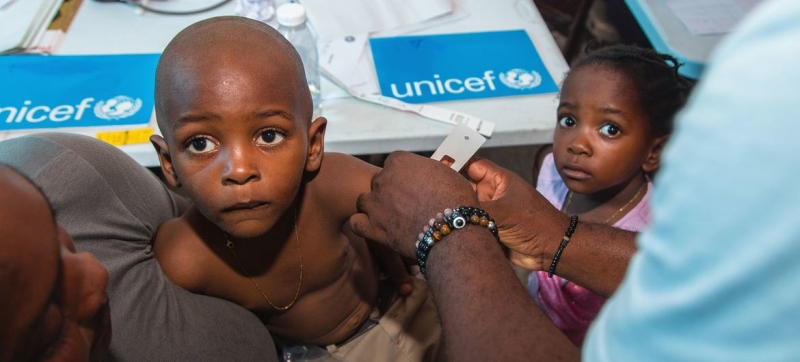
A child is treated for malnutrition at a mobile health clinic in Port-au-Prince, Haiti. New UNICEF report: children in some regions of the world do not receive adequate nutrition Economic Development
The United Nations Children’s Fund (UNICEF) released a new report on Thursday revealing that millions of children around the world are not getting adequate nutrition. The report’s authors call this situation “child food poverty” and link it to inequality, conflict and the climate crisis.
The report warns that millions of children under five struggle to access the nutritious and varied diets they need to thrive. They note that food prices and the cost of living have reached record highs as countries continue to recover from the impacts of the COVID-19 pandemic.
UNICEF Nutrition Specialist Harriet Torlesse , who was also the lead author of the report, said that one in four children worldwide have extremely poor nutrition, consuming just two or fewer of the major food groups.
“So, for example, for a child in Afghanistan, that’s just some bread or maybe milk all day, and almost certainly no vegetables or fruits and no good sources of protein,” she told UN News Service. “This is very alarming because these children cannot survive with such poor nutrition.”
Millions of victims
The report notes that 65 percent of the 181 million children worldwide living in child food poverty live in 20 countries, with about 64 million in South Asia and 59 million in sub-Saharan Africa.
Almost half of all these children live in poor families. But income is not the only factor. The crisis is exacerbated by the fact that in some regions food systems are unable to provide children with nutritious, safe and affordable food, and parents are often unable to provide adequate nutrition for their children.
« The horrific consequences of the conflict in Gaza
More than half of children in Somalia suffer from food poverty in the context of conflicts and natural disasters. The situation for young residents of Gaza, where fighting continues, is even worse – 9 out of 10 children live in conditions of severe food shortages. This shows the horrific impact of the conflict, which puts children at risk of life-threatening malnutrition, the report says.
Other crisis countries such as Burkina Faso, the report says, significantly reduced child food poverty rates. “This shows that if a country does the right things, even if it is a low-income country, progress can be made,” Torlesse said. “[These countries] have made a concerted effort to improve the supply of local, nutritious food, be it legumes, vegetables or poultry.”
Message to Governments
UNICEF calls on governments to act to provide affordable, nutritious foods to young children, strengthen social safety nets to address poverty, and use health systems to provide children with essential nutrition services.
“UNICEF calls on all development and humanitarian partner governments to act now to prioritize actions to end child food poverty,” said Torlesse.
According to her, humanity is fully capable of eliminating this problem and providing all the world’s children with nutrition that will allow them to grow healthy, develop and realize their potential.
